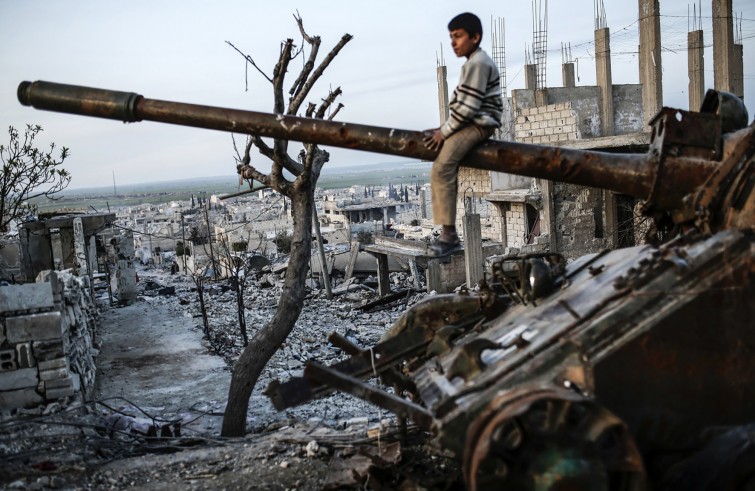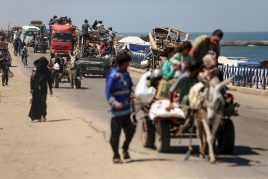
“I will end chaos in the Middle East, settle the war in Ukraine and avoid World War III”, and “I will give Israel the support that it needs to win but I do want them to win fast.” With these words, spoken less than a week after the vote that crowned him the 47th President of the United States, Donald Trump expressed his determination to continue the ‘Middle East’ policy that characterised his previous presidential term (2017-2021), during which he recognised Jerusalem as the capital of Israel, withdrew from the Iranian nuclear deal and promoted the Abraham Accords that encouraged closer relations between Israel and a number of Arab countries – such as the Emirates, Bahrain and Morocco.
No less significant was the message of Prime Minister Benjamin Netanyahu congratulating “his friend” Donald Trump on his electoral win that “reaffirms our strategic bilateral relations and stands as a powerful recommitment to the great alliance between Israel and America.”

Alessia Melcangi, Research Fellow at the Italian Institute for International Political Studies (ISPI), believes that Donald Trump’s second term will not bring about any significant unexpected developments. While “there will undoubtedly be a shift in approach compared to the Biden administration, Trump’s Middle East policy will continue in line with its fundamental pillars of defence and the unquestionable alliance with Israel.” This would entail the re-launching of the Abraham Accords and the alliance with Saudi Arabia, with the objective of establishing a new “security framework” in the region that would afford greater roles to regional allies and give the United States a “back seat” role, with the aim of avoiding its direct involvement in the ongoing regional conflict. In terms of the region’s ‘enemies’, most notably Iran, “a resumption of extensive pressure on the Islamic Republic is a probable scenario.” Trump’s vision of a Middle East driven by business interests, primarily those of the Saudis and US, implies that obstacles to this goal must be removed. This involves “swiftly” ending the war in Gaza and southern Lebanon.
With regard to Gaza, do you think that Trump will facilitate Israel’s plans and push for the complete destruction of Hamas?
Trump will probably be inclined to support his Israeli ally as much as possible insofar as the conflict can be ended, although I believe that at some point he will have to bring him to the negotiating table with the Palestinians. Ending the conflict by giving Israel a free hand is not an option, in my view. If the Palestinians are to accept a ceasefire agreement, they will need to be promised a minimum benefit in return, however symbolic it may be. Let us remember here the position of Saudi Arabia, which views the granting of recognition to the Palestinians – I am not saying a state, but some form of recognition – as a “conditio sine qua non” for the resumption of a regionally structured Middle East, with pre-October 7 alliances in place. Saudi Arabia is concerned about this issue, not because it is pro-Palestinian, but because of the problems it might cause at home.

A symbolic recognition rather than the ‘two peoples, two states’ solution called for by the international community?
That solution is dead and buried. When you look at a map, a territorial map of the area, you will see no other state. We talk about two peoples, but we cannot talk about two states. Because the West Bank is constantly interrupted by Israeli settlements, there is no prospect of a state with territorial continuity. On paper it is impossible.
Israel has also been fighting the pro-Iranian Lebanese militia Hezbollah in the north for weeks. How do you think Trump will approach this conflict? Will he give Netanyahu a free hand or, more realistically, ask him to recalibrate his military response towards de-escalation?
My guess is that the American president will ask Israel to de-escalate the conflict in Lebanon as well. There could be a call for moderation on all fronts. This could lead to the return of displaced Israelis from the north, but not to the creation of an Israeli buffer zone in southern Lebanon up to the Litani River, as Netanyahu wants, because that would mean de facto handing over control of the area from UNIFIL to the Israeli military. It all depends on how quickly Trump wants to end the conflict.
Will Trump’s election push the Netanyahu government further to the right?
To drive the Israeli government further to the right is no easy task. It seems probable that President Trump may lend some degree of legitimacy to the actions of this government, which were somewhat “challenged” by the Biden administration. The latter administration found it impossible to recognise the actions of settlers affecting Palestinians in the West Bank. It would have been entirely counterproductive, even for the Israeli government itself. However, with Trump, this legitimisation might be possible. Nevertheless, if Trump aims to negotiate an end to the conflict, he will not afford the settlers unconditional support to occupy the entire West Bank and drive out the Palestinians. Consequently, even at the cost of some disagreement with Netanyahu, he will have to limit that support.

Another outstanding issue, and not as of today, is Iran. Having shelved Obama’s nuclear deal, what can we realistically expect from Trump? Perhaps a go-ahead for Netanyahu against the ayatollahs’ regime? Or the implementation of the Abraham Accords, perhaps even involving Saudi Arabia (the world’s fifth-largest arms buyer, the world’s second-largest oil producer, investing billions in infrastructure) with a view to normalising its relations with Israel?
Trump would gladly give Israel a free hand, allowing it to attack Iran’s oil terminals or nuclear facilities. But ‘maximum pressure’ on Iran would be extremely risky, dragging the US into a direct confrontation it doesn’t want. Moreover, it could have the side-effect of causing Iran to retaliate, not against Israel, but against the Saudi and Emirates’ oil terminals. The Gulf states are well aware of this. All this could jeopardise the possibility of resuming the Abraham Accords. Trump will have to be careful not to give Israel carte blanche, because the backlash could directly affect the US and other countries in the region.










